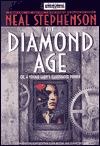
 The Diamond Age: Or, a Young Lady’s Illustrated Primer
The Diamond Age: Or, a Young Lady’s Illustrated Primer
By Neal Stephenson; read by Jennifer Wiltsie
12 Cassettes; Approx. 18 hours [UNABRIDGED]
Publisher: Time Warner Audio
Published: 2001
ISBN: 1586211145 (Cassette)
Themes: / Science Fiction / Nanotechnology / Computer Programming / Victorian Culture / Cyberpunk /
Earlier, I reviewed Neal Stephenson’s Snow Crash. It was one of the finest audiobooks I’d ever heard, and I feel that this one may be even better. Snow Crash was irreverent and whimsical, and The Diamond Age is that and more, with a plot that is both epic and personal.
Nell is a little girl, 4 years old when we first meet her. Her brother, Harv, gives her a stolen copy of the Young Lady’s Illustrated Primer, an interactive (“ractive”) book that was designed by an engineer who wanted his own daughter to experience a bit more than the traditional education. Nell’s mother flits from abusive relationship to abusive relationship, with Nell and Harv protecting themselves as they can. Nell spends more and more time with the Primer, which teaches Nell through stories told by real interactive actors (“ractors”) via the Net.
The story is complex and mature. The main storyline follows Nell’s life, and along the way we see an amazing world. The world has become nearly tribal again with people gathering in Claves, each with their own rules and culture. Much time is spent in a neo-Victorian Clave, a place where Victorian culture is adopted because it is felt that one has to go back to the 19th century to find a viable model for society.
Stephenson explores two technologies in the novel as well, and they are both of equal influence on the story. The first is the Net and the entire idea of interactive entertainment, which makes the Primer possible. The second is nanotechnology, which is used in everything from planet building to the creation of stuffed animals in a Matter Compiler. There are also nano-mites which float in your bloodstream and can do anything from carry information to kill you with thousands of tiny explosions.
The drawback to this novel is its ending, which, though inadequate, would not keep me from recommending it. The rest of the book is so astonishingly strong, that to miss it would be missing one of the major works of modern science fiction.
The Diamond Age could not have been an easy novel to perform, but Jennifer Wiltsie did so admirably. This is the first I’ve heard her, and I hope to hear her voice often. She had just the right tone for this, and I had no trouble at all discerning the characters in this complex novel. An excellent job.
This title is also available on Audible.com.
posted by Scott D. Danielson


 The Diamond Age: Or, a Young Lady’s Illustrated Primer
The Diamond Age: Or, a Young Lady’s Illustrated Primer Queen of Angels
Queen of Angels